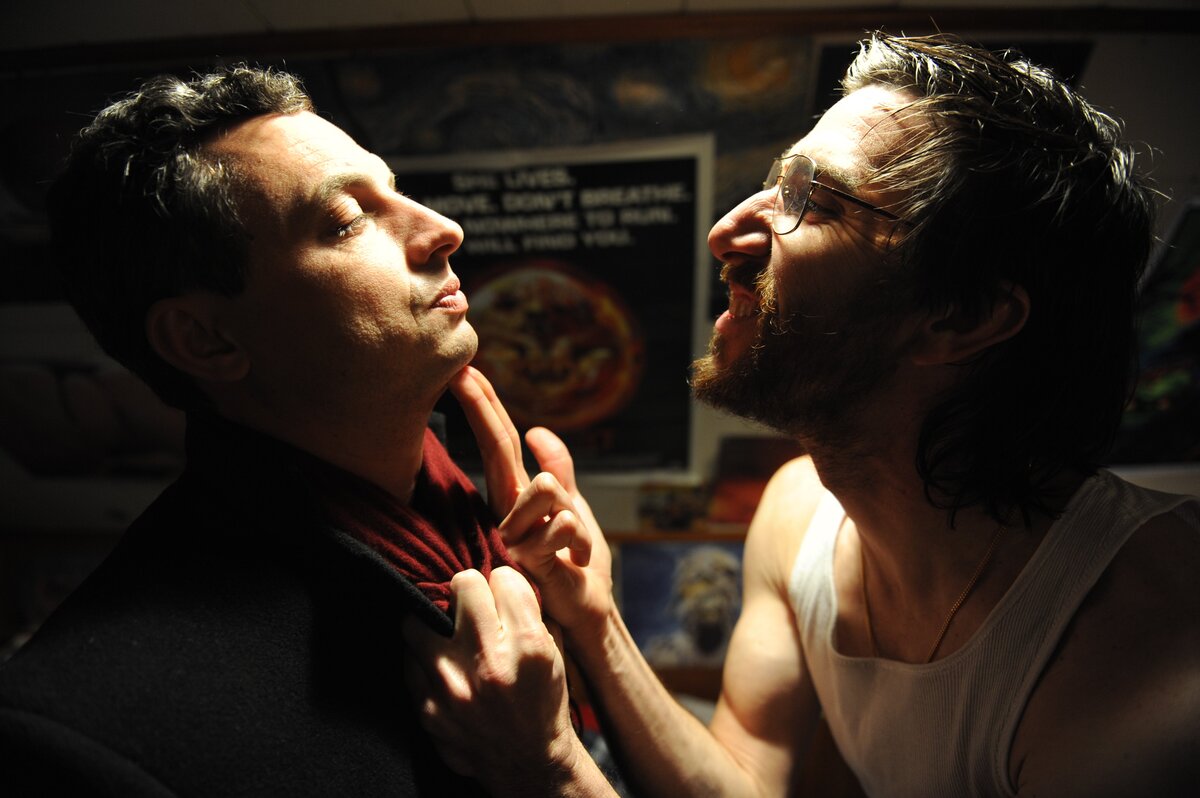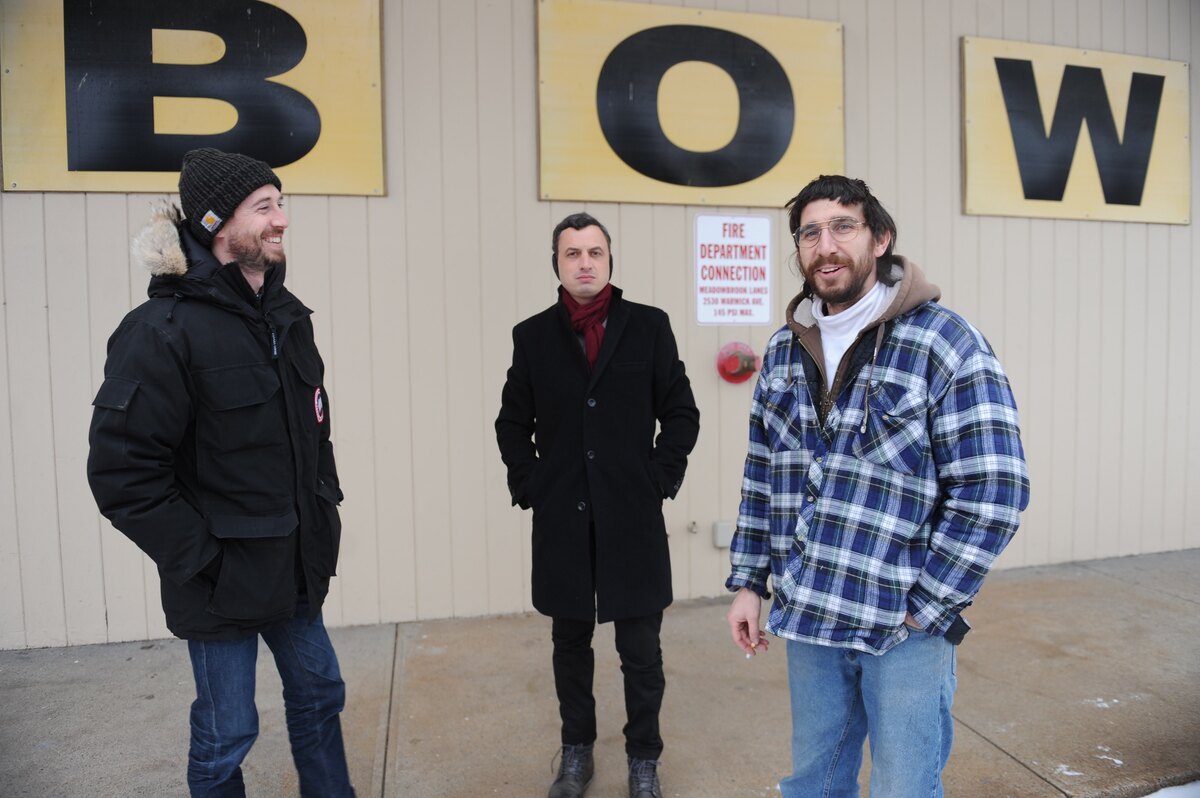
Producer Kyle Martin and Director Kris Avedisian Discuss Their New Feature, Donald Cried
by Lily and Generoso Fierro
During last year’s AFI Fest, seated in a theater nearly 3,000 miles away from New England, our former home, we felt we were at a safe enough distance to watch Donald Cried on the big screen. The sunny days and cool nights of Los Angeles had lessened the trauma of the snow and the dreaded grey slush that we experienced merely two years before, allowing us to see the snow-covered streets and sidewalks of Warwick, Rhode Island in Donald Cried without convulsing. Beyond the snow (and perhaps because of the miserable winter weather), many New Englanders tend to possess a rare social ability to deliver brutally unfiltered backhanded statements under the guise of acceptable friendly behavior during the most awkward moments imaginable, and with Donald Cried, director, screenwriter, and star, Kris Avedisian gives you an often funny but gut-wrenchingly real glance into the lives of two men who have each been affected in different ways by their experience of growing up in the same small Rhode Island town.
Avedisian plays the title character of Donald to perfection. Donald lives in the same room he has lived in his whole life and works part time for his stepfather/boss at the local bowling alley as he holds on to the vestiges of his long gone teenage years. Into this world enters Peter Latang (Jesse Wakeman), Donald’s friend of sorts from childhood, who is visiting their hometown of Warwick to handle the affairs of his late caretaker and grandmother. Peter has long left behind Donald’s world for an upscale New York City life in finance, but upon his return, he has lost his wallet and must rely on his estranged friend Donald for cash and transportation. Through an act of genteel blackmail that is cleverly disguised as beneficence, Donald then proceeds to take Peter on an uncomfortable trip down memory lane where Peter is not-too-subtly reminded of his transgressions against his now captor/tour guide.
One of our favorite films from last year’s AFI Fest, Donald Cried, which opens in theaters on Friday, March 3rd, succeeds by studying a single day collision between two contrasting characters in a way that dredges up our own discomforts with the past and present without ever losing energy in its dialog or connection to its setting. We sat down with producer Kyle Martin and Kris Avedisian to discuss Donald Cried and to also, perhaps, quell our uneasiness about the film due to the projections of our anxiety from living in New England onto the actions of Donald and Peter in the film.
Q: Peter seems to have followed the trajectory that many small town New Englanders do who really dislike the small town that they have grown up in. Usually, it involves a trip to Boston for college followed by working in New York City, which many view as the evil empire. Is that cultural distinction between New York City and small town Warwick important in the construction of Peter’s character? Or is New York just a place not too far away where Peter can find anonymity?
A: Kris Avedisian (KA): It’s a bit more of the latter. But that being said, people in Warwick view NYC less as an evil empire and more as a symbol of success. It’s something Peter can come home feeling proud about even though he’s probably living in some shit-hole feeling isolated and alone, much like Donald who never left home.
Q: In New England, there’s this weird keeping up with the Joneses phenomenon that often manifests itself instantaneously as contempt for no apparent reason. For example, two people from New England might admit that they are Boston Bruins fans but harass one another as to what level they are fans. You see it in Donald’s stepfather who runs the bowling alley where Donald works and has this constant need to antagonize, and we see it in little moments in Peter and Donald’s interactions with each other. For you, is this mentality particular to New England or is it just particular to growing up in a small town in general?
A: KA: I can’t speak for other small towns, but growing up in Warwick, it was completely normal for people to be forward about their opinions and to always bust balls. It wasn’t until I moved to California that I realized it wasn’t like that everywhere. Kyle Espeleta (writer) tells the story of when we first met. We were walking through a Safeway parking lot. I was eating a pre-packaged pasta salad, and this lady was getting upset with us because she was trying to back out of her parking spot. I simply yelled back at her with a mouth full of food, “Calm down lady.” Kyle was taken aback; he’d never seen someone have that type of reaction. He thought to himself, “Wow I’m with this tough New York, east coast dude.” I’m far from tough. It was just a natural response.
Q: Kyle, you mentioned you grew up in Georgia. Did you find the New England attitudes portrayed in Donald Cried startling as someone who grew up in the southern part of the United States?
A: Kyle Martin (KM): I was actually born in Iowa and lived there for the first six years of my life, and then I lived in the suburbs of Chicago for six years, which were followed by six years of high school in Georgia before I moved to New York (where I’ve lived for the last 17 years). So, I feel I’ve experienced a big part of this country and the various perspectives and attitudes, so the characters in Donald Cried didn’t really shock me. More than anything, I could really relate to Pete in his experience of going back to this place that you’re from and being immediately struck by the ghosts of your former self. That really resonated with me — that was totally a big part of my draw and my personal relationship to the material. I’m always thinking about how my life would be different if I had never left any of those places I lived.

Q: This might be the pessimistic New Englanders in us, but immediately after seeing the film, we agreed that that Donald Cried was the most cunning psychological revenge film of the year. And here, we are thinking of the photo album scene that takes place at Peter’s grandmother’s retirement home. It almost seems like Donald made sure that every missed birthday was documented in preparation for the day that Peter would finally returned home. In writing and portraying Donald, Kris, did you think of him as a calculating, vindictive character?
A: KA: I don’t believe Donald has vindictive bone in his body. He can be calculated when it comes to getting what he wants, but all he really wants is happiness for himself and others.
Q: Kyle, you produced two films that we saw at AFI Fest in 2016, Donald Cried and Dash Shaw’s animated debut My Entire High School Sinking Into the Sea. Though the two films are radically different in visual style and construction, they both do feature unlikable but complex protagonists experiencing a key moment in self-realization and growth. Was this a connecting theme that drew you into producing these films nearly in tandem? If not, what attracted you to these projects in particular?
A: KM: That’s a great observation; I’ve never really compared the two movies and their protagonists in that way. I could certainly go down the wormhole of analyzing whether there was something subconsciously within me that was drawn to those issues at this point in my life, but that would undoubtedly bore everyone to death. Suffice it to say that the main thing that drew me to both of these films was the writing, specifically the tone. They’re both very playful, and they both use humor to access really uncomfortable themes and moments. I think having both of the protagonists skew toward the unlikeable only heightens the experience. At the end of the day though, both Dash (the character) and Donald are really sensitive, gentle people. They’re just very much in their own world with their own perspectives. They’re people that are just living their lives the way they want, the way that comes naturally to them even if they’re unaware that the people around them think they’re crazy. I like that idea a lot, and I definitely want to keep making movies about people like that, but I can’t honestly say I thought about this while we were making the movies.
Q: In terms of defining character, Donald Cried ends with a Milli Vanilli track, which Kris explained in previous interviews as a way to complete the feeling of Donald and Peter’s world. Why close with late-‘80s pop rather than ’70s hard rock or ’80s heavy metal, which come up in Donald and Peter’s past together?
A: KA: Milli Vanilli came out when I was in the sixth grade. I loved that whole album. I was a boss then. Once I got to junior high everything started to suck. The song seemed to reflect the comedic, melancholy spirit of the movie. It also represented that send off to innocence for me. But, the real answer is that everything else we tried didn’t work nearly as well.
KM: I really love that the movie doesn’t cut to hard rock or heavy metal. We definitely tried that version, but one of the things I love about the movie is that it’s constantly doing the opposite of what the audience expects; that’s what makes it so much fun for me as a viewer anyway. Just when you think things are going to get crazy and “big” in a Donald way, the movie goes to a more tender, emotional place. And conversely, when you’re in a scene like the funeral home when you’d expect things to be reverential and somber, the movie goes to a really ridiculous, outlandish place. The Milli Vanilli end credit song is just a continuation of that in my mind.
Q: Speaking of music Kyle, Lily is an avid Dinosaur L and Loose Joints fan and has been for years. How did you get involved with Wild Combination: A Portrait of Arthur Russell?
A: KM: Matt Wolf (the director of Wild Combination) and I have been close friends since college. We’ve been making movies together for years — I did all of the production sound work on his student films, and Wild Combination was just a natural evolution of our relationship. It started as a series of small vignettes about Arthur that were originally designed to play as short pieces in more of an art gallery setting, but the more we got into it, the more we realized there was a feature film there. I’m still working with Matt! He and I are making a feature length doc about Marion Stokes, a fascinating, unheralded activist who secretly taped broadcast news from the late 70’s up until her death in 2012 and thus amassed an incredibly rare and unparalleled archive of American television. ◼













